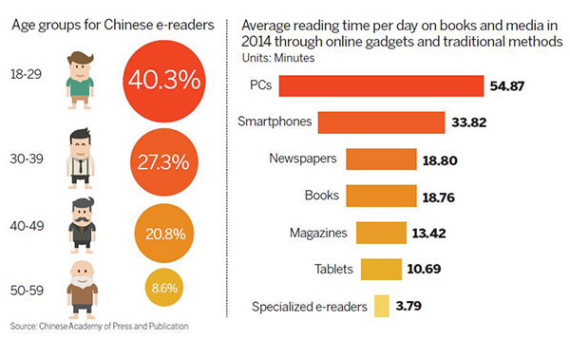


Tencent has focused on content-and lots of it. Earlier this year, the Web behemoth bought Shengda Literature, the most popular online literature site in China, from Shanghai Shanda Networking (Group) Co Ltd.
The company was immediately integrated into Tencent's literature unit, which was rebranded as China Reading Ltd.
This year, China Reading plans to invest more than 1 billion yuan into purchasing copyrights for books from traditional publishers.
"Tencent has millions of users ready to be transformed into mobile readers," Yao said. "Publishers also have huge libraries of books, so they will make ideal partners in the mobile world."
Even so, turning these big picture plans into hard cash will not be easy as Alibaba and Tencent will have to muscle out established players.
In the first quarter of this year, Tencent's book.qq.com had just 18 percent of the mobile reading market, which was dominated by e-books.
While it has more than a foothold, the online platform trailed iReader, a mobile app from Beijing Palm Reading Technology Co Ltd.
With 17 million daily users, iReader's market share was 27 percent.
Just behind the big two came tadu.com, which has 10 percent of the market, while XM.91.com, a mobile app rolled out by search engine company Baidu Inc, has 9.6 percent.
"It takes time to accumulate users," said Cheng Xiangjun, chief executive officer of iReader. "We have been plowing money into mobile reading for years (without giving details).
"Our vast collection of books is our most valuable asset," he added.
At the last count, iReader had more than 400,000 e-books, which were mostly Chinese language, with 90 percent converted from hard copies. But that is still 220,000 less than Tencent's library.
"Internet heavyweights are cash-rich, but they can't convert hard copy books into e-versions and audio products simply by throwing money at the problem," Cheng said. "It is a time consuming process."
Another obstacle facing Tencent and Alibaba is the issue of copyright. Although both companies and the majority of online readers are aware of intellectual property rights, piracy is still rampant on the Web.
"Most readers still stick to the habit of downloading books for free from computers and digesting them on mobile phones," Yao said. "But sometimes they don't know that they could be breaking copyright laws."
The report by the Chinese Academy of Press and Publication showed only 33 percent of mobile readers were willing to pay for e-books. Also, the average cost spent on e-books was down to 16 yuan last year compared with 22 yuan in 2013.
What makes this even more complicated is that some authors are reluctant to release e-versions because of poor royalty fees.
"In general, when books are sold in hard copies, authors usually get between 8 percent to 15 percent of the sales revenue," said Tao Weipeng, an editor of e-books in China CITIC Press, a leading publisher in China.
"While in terms of e-books, which are 60 percent cheaper, the income for authors is significantly less. And the sales volume does not make up for that shortfall."
But despite problems, the boom in e-books is unlikely to turn into a bust.
"As Internet giants beef up their e-book catalogs and industry regulators intensify efforts to crack down on copyright violations, more users will shift to mobile reading for entertainment," Yao said. "This is a growing trend."
 |
 Beauty of Tsinghua University transforms into car model
Beauty of Tsinghua University transforms into car model Mums stage breastfeeding flash mob
Mums stage breastfeeding flash mob Moscow “spider-man” climbs Chinese skyscraper
Moscow “spider-man” climbs Chinese skyscraper No cleavage allowed at China’s largest gaming expo this year
No cleavage allowed at China’s largest gaming expo this year Photo story: A model’s breast implant surgery
Photo story: A model’s breast implant surgery Student proposes during graduation ceremony
Student proposes during graduation ceremony Kiss contest held in Nanning, SW China
Kiss contest held in Nanning, SW China Bikini beauties lifeguards in river rafting place
Bikini beauties lifeguards in river rafting place An unbreakable army
An unbreakable army Sharing with strangers
Sharing with strangers US cyber ‘retaliation’ shows hypocrisy
US cyber ‘retaliation’ shows hypocrisy Markets fall again despite govt support
Markets fall again despite govt support China’s police dogs train to sniff out crime
China’s police dogs train to sniff out crimeDay|Week